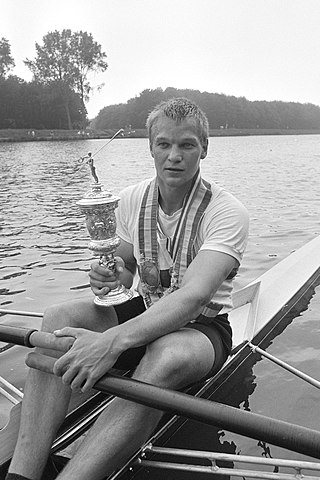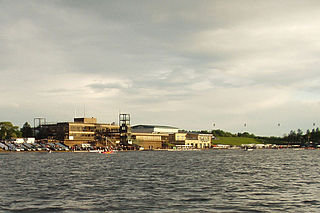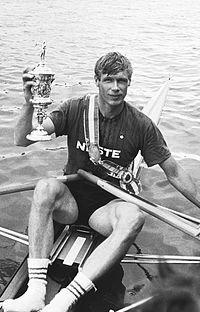
Peter-Michael Kolbe was a German rower who specialized in the single sculls. In this event, between 1975 and 1988 he won five world titles and three Olympic silver medals, in 1976, 1984, and 1988; he missed the 1980 Games because of their boycott by West Germany. His career is known for the rivalry with Pertti Karppinen that stretched for 14 years.

Vyacheslav Nikolayevich Ivanov is a former rower, and one of the most accomplished rowers of his generation. He crewed for the Soviet Union, and he won the Olympic gold medals in the single sculls class at the 1956 Melbourne Games, the 1960 Rome Games and the 1964 Tokyo Games.

Thomas Lange is a German rower who won two gold and one bronze Olympic medals in the single sculls.

Alf John Hansen is a retired rower from Norway. Early in his career, he received two Norwegian sport awards shared with his brother Frank. Towards the end of his career in 1990, he was the inaugural recipient of the Thomas Keller Medal, the highest honour in rowing. His international rowing career spanned more than two decades.

Hans-Joachim Böhmer was an East German rower who won a bronze medal in the double sculls at the 1972 Summer Olympics, together with Uli Schmied. They also won a European title in 1971 and a silver medal at the 1970 World Rowing Championships. In other rowing events Böhmer won a bronze medal in the eights at the 1966 World Rowing Championships.

Rüdiger Reiche is a retired German rower and a 1976 Olympic champion in the quadruple sculls. Between 1974 and 1985 he won eight medals in single, double and quadruple scull events at the world championships, including two gold medals. After retiring from competitions he worked as a rowing coach at the club and national levels, training Daniel Haudoerfer and Hubert Trzybinski.

Igor Aleksandrovich Rudakov is a Russian coxswain who competed for the Soviet Union in the 1960, 1964, 1968, and in the 1972 Summer Olympics.

Oleg Grigorevich Tyurin was a Russian rower who had his best achievements in the double sculls, partnering with Boris Dubrovskiy. In this event, they won an Olympic gold in 1964 and four medals at European and world championships in 1962–1965.

Jochen Meißner was a leading single scull rower of West Germany between 1965 and 1972. In this event, he won national titles in 1965–1968 and a European title in 1965; a silver medal at the 1968 Summer Olympics, as well as bronze medals at the world (1966) and European (1969) championships. At the 1967 European Rowing Championships in Vichy, he came fourth in the single sculls. He also competed in the double sculls at the 1972 Summer Olympics, together with Arthur Heyne, and finished in tenth place.

Hans-Ulrich Schmied is a retired German rower who specialized in the double sculls. In this event he won bronze medals at the 1972 and 1976 Olympic Games and finished in fifth place in 1968. He also won one world (1974) and two European titles. Schmied went to the 1978 World Rowing Championships on Lake Karapiro in New Zealand as a reserve but did not compete. It was at those championships that he got closer to one of the female rowers whom she later married; Bärbel Bendiks was also present as a reserve.
Peter Niehusen is the only sportsman to have won international medals as both a coxswain and a rower. He won two gold medals and three bronze medals at the European and World Championships and the 1976 Summer Olympics in Montreal.
The 1962 World Rowing Championships were the inaugural world championships in rowing. The competition was held in September 1962 on the Rotsee in Lucerne, Switzerland. Rowers from West Germany dominated the competition, winning five of the seven boat classes.

The 1966 World Rowing Championships was the second time that world championships in rowing were held. The regatta was held from 8 to 11 September at Lake Bled in Bled, Slovenia, Yugoslavia. There were 613 rowers from 32 countries who competed in the seven Olympic boat classes. Marketing and advertising for the event were handled by Cesar Lüthi.
The 1970 World Rowing Championships was the 3rd World Rowing Championships. It was held in 1970 at the Royal Canadian Henley Rowing Course in St. Catharines, Ontario, Canada. The competition involved seven events. Prior to the 4th World Rowing Championships in 1974, only men competed.

Wolfgang Hönig is a retired East German rower who won two world titles, in the single sculls in 1974 and in the quadruple sculls in 1975.
Reima Juhani Karppinen is a retired Finnish rower who specialized in the double sculls. In this event, he won a silver medal at the 1981 World Rowing Championships, together with his legendary brother Pertti. He competed at the 1984, 1988 and 1992 Summer Olympics, with other partners, and finished in 8th, 12th and 13th place, respectively.

The men's single sculls competition at the 1976 Summer Olympics took place at Notre Dame Island Olympic Basin, Canada. The event was held from 18 to 25 July. There were 15 competitors from 15 nations, with each nation limited to a single boat in the event. The event was won by Pertti Karppinen of Finland, the nation's first medal in the men's single sculls. Karppinen would go on to win three consecutive golds in the event, matching the Soviet Union's Vyacheslav Ivanov who did the same from 1956 to 1964. Silver went to Peter-Michael Kolbe of West Germany; East Germany took its second consecutive bronze medal in the event, this time with Joachim Dreifke as the rower.

The men's single sculls competition at the 1984 Summer Olympics took place at Lake Casitas, California, United States of America. The event was held from 31 July to 5 August. There were 16 competitors from 16 nations, with each nation limited to a single boat in the event. The event was won by Pertti Karppinen of Finland, his third consecutive victory. Silver went to Peter-Michael Kolbe of West Germany; Kolbe, who had also taken silver in 1976, was the ninth man to earn multiple medals in the single sculls and the first to do so in non-consecutive Games. Canada earned its first medal in the event since 1912 with Robert Mills's bronze. East Germany's three-Games podium streak ended with no rowers from that nation present due to the Soviet-led boycott.
The 1974 World Rowing Championships was the fourth World Rowing Championships. It was held from 4 to 8 September 1974 and from 29 August to 1 September 1974 on the Rotsee in Lucerne, Switzerland. The event was significantly extended from the 1970 edition, with the addition of both women's and lightweight men's events. Six women boat classes were added, three lightweight men classes, plus quad scull for men, increasing the number of boat classes from seven in 1970 to seventeen in 1974. This was also the last World Championships held on a quadrennial cycle – from this point, World Championships were held annually.

The 1975 World Rowing Championships was the fifth World Rowing Championships. It was held from 21 to 30 August at Holme Pierrepont National Watersports Centre in Nottingham, England.















